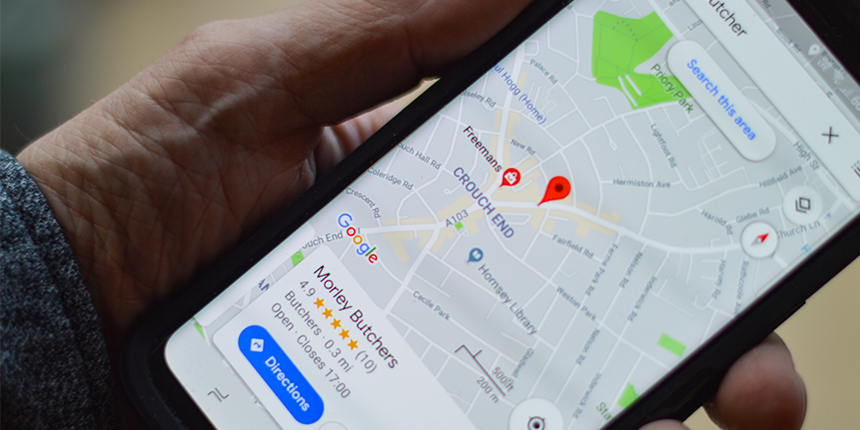March was an action-packed time in the world of Local Presence Management (LPM). It saw the release of major changes for Google, Yelp, and Instagram—changes that are significant for not only SEO specialists but for the users engaging with these platforms. With new functionality on some of the biggest platforms in the entire online ecosystem, these are the biggest news stories for anyone striving to make gains in local SEO.
Google releases Florida 2
Despite having no relation to Google Florida update in 2003, Florida 2 follows up last August’s Medic update to Google’s core algorithm. Like Medic, it appears to focus on health and medical industries. Many sites that saw gains in August are now losing their positions in March. Likewise, some sites penalized by Medic are seeing their positions restored.
The Medic update was intended to target medical and health websites with questionable authority, but actually had a negative impact on many legitimate healthcare industry sites. Florida 2 will likely address this error—so if your healthcare website saw gains or losses in the second week of March, this algorithm update may be the culprit.
Website and review content in the Local 3-Pack
Content tied to a listing is incredibly important. It’s why DAC and other local SEO experts recommend generating content-rich store pages and reviews (as well as review responses) that contain target keywords.
Within the Local 3-Pack, reviews, website URLs, and Google Posts are now appearing along with some queries. For example, searching for “coffee shop with Wi-Fi” can pull review content that mentions the keyword “Wi-Fi” to be displayed within the 3-Pack.
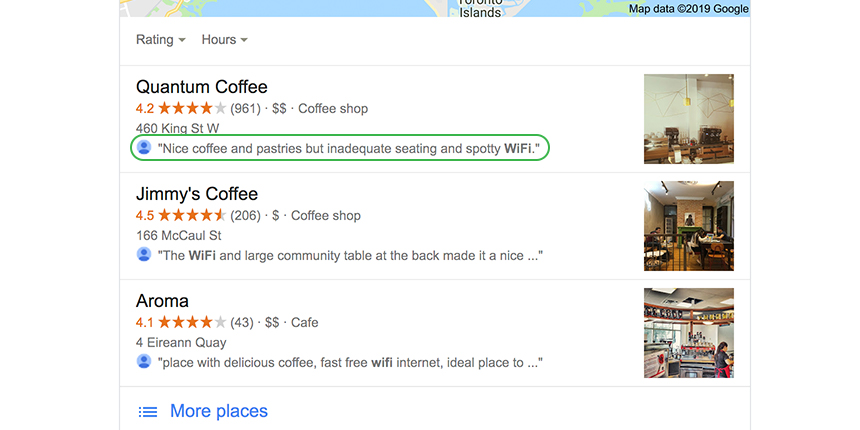
This is great for users as previously these location details weren’t easy to obtain. With reviews and Google Posts text appearing right below the star rating, it is now much easier to see that the listings have specific characteristics rather than just good search engine optimization.
Listings managers should take note of this change. If you’re not already attempting to increase your content-rich review volume, you will need to do the heavy lifting yourself and write Google Posts with the keywords you need. Both are appearing in the Local 3-Pack and you do not want to lose out to competitors because your restaurant doesn’t have the words “vegan options” appearing anywhere in your reviews or listing content (and, restaurateurs, don’t forget—Google Assistant now supports restaurant booking in 43 states!).
Google launches “Site Manager” role in GMB
As of March 4, we started to see Google roll out the new Site Manager role that was first announced back in November of 2018. For several large chains, we are now seeing a new option in the Business Profile that says “Manage this listing”. These are showing up on listings that are already verified through GMB, but this new functionality will let someone claim the listing and be given the “Site Manager” role. Prior to this, there has not been a way for a business owner to claim an already-verified listing without going through the request ownership transfer process.
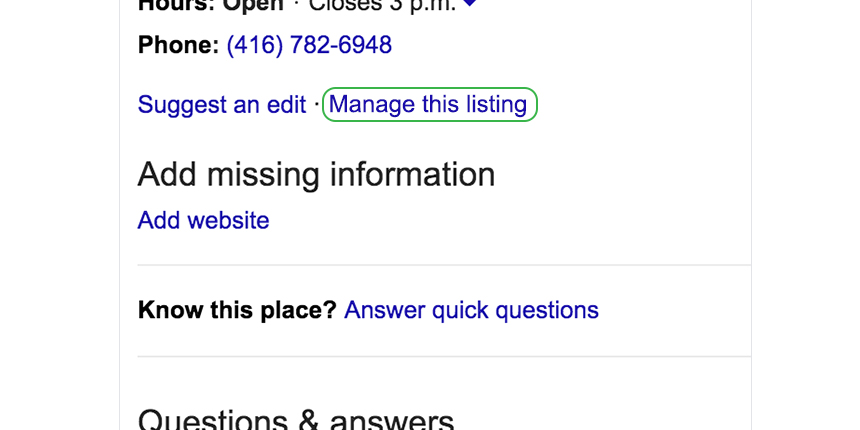
The button works much like the “Own this business” label that appears on unverified listings. Upon completing verification (phone, postcard, etc.), the current owner will get a notification that you now have access to the listing. Your access will be limited: this chart clarifies what actions you’ll be able to do in comparison with managers and listing owners. And if you see this feature on your listings and can do without it, you can contact GMB support to opt out.
Yelp Verified Trade Licenses
Businesses on Yelp can now apply to have their Yelp listings confirmed to have a valid trade license to perform their marketed service in the state they serve. The expectation is that such verification will help build consumer trust in different local businesses.
Verified companies will showcase a blue shield check-mark badge directly next to their business name. Users can click the badge to reveal additional information regarding the company’s licensing. To receive a Verified License badge, companies must apply through Yelp directly, who will then manually verify the license. This feature is currently only accessible for specific service categories in Arizona, California, Florida, Georgia, New York, Texas ,and Washington for $1 per day, with availability in additional states coming soon.
Instagram rolls out in-app local business profile pages
Yelp isn’t the only website with a new update: Instagram is introducing a new way to showcase local businesses with in-app profile pages. These pages look very much like Google local knowledge panels, displaying business address, hours, contact information, and website URL. A link to the business’s Instagram profile is featured prominently at the top of the page.
This feature has yet to be fully implemented—and not all users will be able to view it—but it seems likely that it will become a permanent part of Instagram. With location data already tied to many business’s Facebook accounts, it will be of no surprise if Facebook/Instagram leverage this data to make their platforms a viable option for local search.
GMB profile ads
Google has made it so that users can see an ad right on a business’s GMB business profile of a company. In the example below, A&W Canada has an ad within its profile advertising its breakfast specials. This ad links to A&W’s website and not a third-party booking provider.
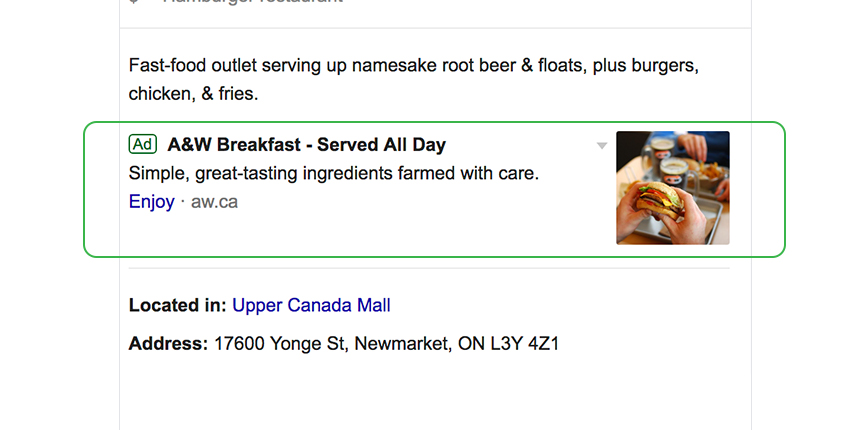
What is stunning about this ad placement is that it could make brands pay for redundant ads within direct brand searches. It has always been the case that brands bid on their direct name, but it has never factored into organic searches before. And what if competitors can bid for ad space within your organic search results? You would be in a lose-lose situation—either you bid for redundant ads in your own business profile or you don’t and suddenly a competitor appears in your organic results. Hopefully this ad placement won’t expand beyond a beta and marketers won’t need to worry about yet another pay-to-play model.
Google Hotels is here
Speaking of pay-to-play, hospitality marketers are already up against it in paid and organic search. For instance, Google does not allow for an appointment/booking URL to be attached to a business profile and instead includes a paid commission booking button. With 65% of hotel revenue typically derived from room bookings, this limitation is having a direct and severe effect on revenue streams.
Google is now attempting to take another slice out of the pie by launching a direct competitor to Hotels.com. Google Hotels offers all the functionality and tools of its competitors such as Kayak, Expedia, and Booking.com, but has the benefit of native integration with Google Maps and Google search results.
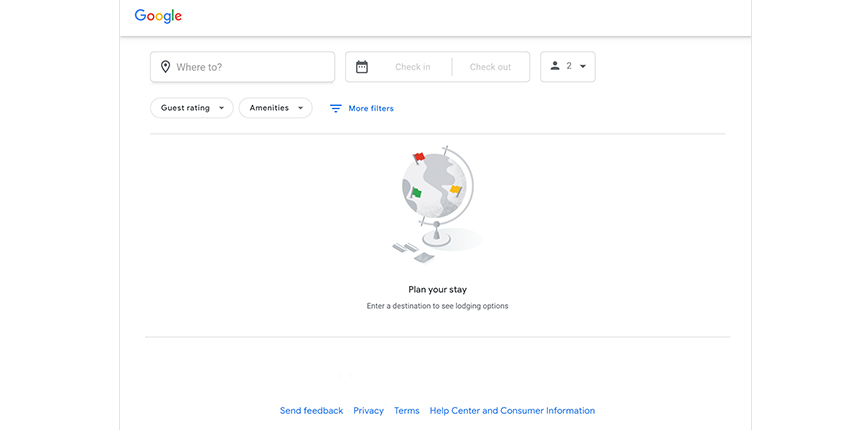
Google Flights has already had a significant impact in its industry, and we expect Google Hotels to do the same. Hotel booking through Google is currently driven by paid ads—and although Google Hotels is too new for us to fully understand and analyze, savvy marketers know that nothing will come for free on this new website.
Unified hotel reviews on desktop Google Maps
When searching any business, Google will provide you with the star rating gathered from their in-house Google reviews. As of late February, hotels are having their Google Review ratings combined with third parties such as TripAdvisor and Booking.com. While these websites are not factored into the visible star rating (as some websites use something other than a five-star scale), they will appear along with Google Reviews when users view the reviews for the location.
With review content appearing in the Local 3-Pack, hotel marketers will have to pay attention to their reviews across all platforms to see how it will affect their Google rankings. While reputation management on all platforms is important, Google has emphasized this for hotels even more than it has for other industries.
It’s complicated to manage a brand’s reputation across multiple platforms for multiple locations—and it’s only going to get more complex as the industry grows and matures. If you need advice, support, or an expert agency to manage your local presence on your behalf, all you have to do is get in touch. Contact DAC.
